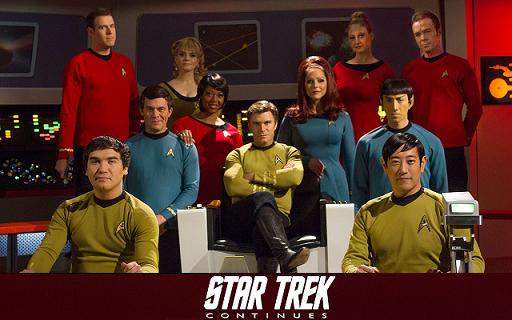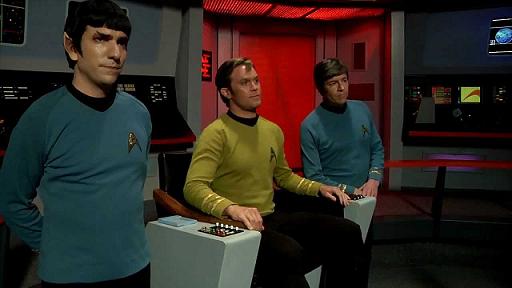
An old bumper sticker read “Star Trek lives.” In this 50th anniversary year, with a new movie set to come out next week and a new TV series next year, that would certainly seem to be true.
But Star Trek’s new adventures aren’t only in those media (or even in books and comics). There have also been a number of fan-made productions. I’m going to talk about two of them today.
The fan productions have gotten some attention lately because CBS/Paramount issued new rules regarding what they can and cannot do. Both Peter David (PAD) and Jerry Chandler have addressed that issue. I’ll also touch on it, briefly, but my main focus will be on those productions themselves and on how Star Trek has become analogous to Shakespeare.
As to Paramount’s new guidelines, as PAD says, fans are “damned lucky.” When I first heard about fan films, several years ago, I was surprised Paramount was okay with their being made. And in his blog, PAD pointed out that the studio wasn’t always so agreeable. He said that at a convention he attended in the 1970s, “Paramount lawyers actually came into the dealer’s room and confiscated peoples’ fanzines from right off their tables.”
The fan productions I want to discuss are Star Trek: New Voyages (formerly Star Trek Phase II) and Star Trek Continues. I think the latter is better, overall, but both productions have produced good stories.
The title Phase II is a reference to the proposed 1970s Star Trek TV series that was scrapped when Paramount decided to make Star Trek The Motion Picture instead.
Both series have attracted Trek alumni as well as actors from other science fiction franchises.
In New Voyages, Captain Kirk was initially played by James Cawley. He’s now played by Brian Gross, whom I prefer of the two.

Star Trek: New Voyages, with Brian Gross as Captain Kirk.
Gross has appeared in a nine-minute vignette called “Going Boldly” and the episodes “Mind-Sifter” (based on a fan fiction short story published in the 70s) and “The Holiest Thing”, in which Kirk meets Dr. Carol Marcus. I thought “Mind-Sifter” was the better of the two.
While I prefer Gross over Cawley as Kirk, the Cawley-led episode “World Enough and Time”, which guest-starred George Takei, was quite excellent.
Star Trek Continues, which stars Vic Mignogna as Kirk and features Chris Doohan— son of James— as Scotty, literally picks up where “Turnabout Intruder” ended and is airing “fourth season” episodes. The first, “Pilgrim of Eternity”, features Michael Forest reprising his role of Apollo from “Who Mourns for Adonis.” Another, “Fairest of them all”, is a sequel to “Mirror, Mirror”, set in the mirror universe.
There are other Star Trek fan productions as well, some set on the Enterprise and some set on other ships. One, which I won’t name, leaves room for improvement. But the people involved seemed like they were having fun.
Which is kind of the point. The various fan productions are all being made by people who love Star Trek.
But they don’t own the rights to Star Trek. And, as Jerry points out:
The filmmaking tools that are available to just about anyone these days means that anyone who wants to can make a film… Computer programs on the market allow you to edit easily enough, and making FX on your laptop these days can result in rendered scenes that would have amazed even some pros 20 years ago.
Is it any wonder CBS and Paramount are imposing some restrictions?
Both PAD and Jerry point out that people can create their own characters and universes, leaving them free from any restrictions. Some people may do that. Some will produce new Star Trek fan productions within the guidelines, perhaps hoping they’ll eventually be loosened.
Others have expressed their belief that Star Trek should be in the public domain.
What that last group doesn’t understand (or doesn’t care about) is that under current copyright law, a creative work remains under copyright for the life of the author, plus 70 years (with a “pseudonymous work, or a work made for hire, the copyright endures for a term of 95 years from the year of its first publication or a term of 120 years from the year of its creation, whichever expires first.”)
If Gene Roddenberry, who died in 1991, had written Star Trek as a series of novels, they’d still be in copyright.
In 1790, copyright was for a mere 14 years, with a 14-year renewal. Personally, I think the current system (for individuals) is better. The length shouldn’t be extended, however.
But such lengthy copyright protection should only apply to people, not corporations. After some reasonable period, Star Trek (in all its TV and film incarnations) should go into the public domain. Certainly by 2066.
Until Star Trek becomes public domain, fan productions will just have to accept the restrictions of playing in someone else’s sandbox.
Now what’s this Shakespeare connection I mentioned?
It’s very simple. I suspect that Star Trek will be like Shakespeare’s plays, with performances and adaptations going on for years and centuries to come. The current fan productions and the new films are just some examples. They were hardly the first.
Back in the mid-90s, I read about a Star Trek stage play I’d intended to see, but never did. What I remember from the review at the time was that— in a knowing nod to how things were on the original series— fight scenes were performed by stunt performers who looked nothing like the actors.
I doubt that was the first Star Trek-inspired play, either.
And while Shakespeare is rightly acknowledged for the quality of his work, he did write for the masses. Had the technology existed at the time, he’d have been a TV writer. So the analogy isn’t coming from out of left field.
Had Shakespeare been brought through time to the 1960s, I wonder what sort of Star Trek episode he’d have written.
Probably a Tribbles episodes set in the mirror universe.
And speaking of Shakespeare, for those who feel any adaptation of Star Trek has gotten it wrong, I remind you of a scene from Sandman #13, “Men of Good Fortune”, in which Morpheus has one of his once-a-century meetings with the immortal Hob Gadling in 1789.
“I saw King Lear yesterday,” Hob says. “Mrs. Siddons as Goneril. The idiots had given it a happy ending.”
“That will not last,” Morpheus replies. “The great stories will always return to their original forms.”
Whatever adaptations lay ahead, Star Trek, at its core, will always be about exploring, seeking out and boldly going.
Copyright 2016 Patrick Keating.